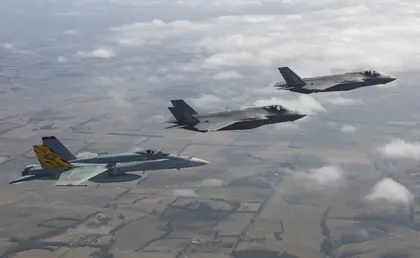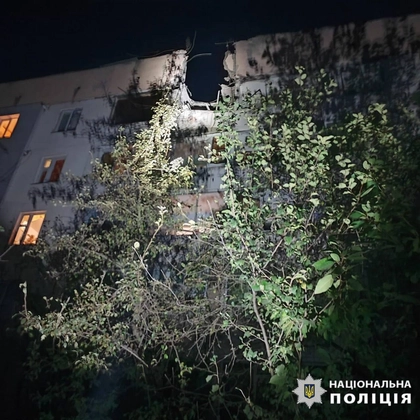Twitter is where the idea of transferring old Australian jets to Ukraine started, according to one of Australia’s leading experts on the Royal Australian Air Force (RAAF) retired F/A-18A/B Hornet fighters.
And, in an article in Riotact today, Andrew McLaughlin, an award-winning Australian defense and aerospace journalist with 25 years experience, has pointed out practical and operational hurdles to a potential commercial sale and timely transfer of the approximately 40 remaining aircraft.
JOIN US ON TELEGRAM
Follow our coverage of the war on the @Kyivpost_official.
These include the Hornets’ potential lack of quality and up-to-date maintenance, and the lack of a workforce to regenerate them to military performance capabilities.
In terms of the sale/transfer concept, McLauglin, the former editor of Australian Defense Business Review, wrote in his piece that “this is not a new idea” while acknowledging “there is likely something to the story.”
“[The idea] initially appeared to come from enthusiasts’ Twitter feeds and websites last year when the idea of transferring F-16 fighters to Ukraine from former European NATO countries’ stocks was first mooted, and it popped up again earlier this year,” McLaughlin wrote.
The RAAF fleet of 71 F/A-18A/B Classic Hornet aircraft, associated spares and support equipment has been progressively withdrawn from service from January 2019 to December 2021.

South Korea Demands 'Immediate Withdrawal' of North Korean Troops in Russia
McLaughlin goes on to note that, in late 2019, when “about half the RAAF’s fleet had already been retired, I saw at least a dozen of the jets crowded tightly together under the old ‘carport’ shelters but otherwise out in the open at RAAF Williamtown.”
“Even then, many had already been stripped of control surfaces, engines, panels and other components to keep the remaining jets flying,” he wrote while transparently noting that he is not a pilot or engineer.
According to McLaughlin, the better planes and plane parts from the overall 71 retired Hornets have now been ‘cherry-picked’ by Canada (who have already taken “the best 20”), Malaysia, and aviation museums.
The situation as described by McLaughlin appears somewhat in contrast to an unnamed source cited by AFR earlier this week. The source told journalists that the remaining planes are “perfectly good aircraft” and could be made “operational within four months.”
“The term ‘perfectly good’ is likely a theoretical one,” McLaughlin wrote.
“When withdrawn from service, the Hornet was still a very capable fighter, but most of the airframes delivered between 1984 and 1991 were worn out…The last ‘deep maintenance’ of an RAAF Hornet was conducted in June 2020,” he wrote.
“While the remaining jets may theoretically have a couple of years’ service life left in them, that they could be made ‘operational within four months appears to be wildly optimistic,” McLaughlin continued.
“There is also no workforce in place to perform this work. The RAAF maintainers and engineers at Williamtown have been transferred to the new F-35A, while the Boeing workforce has dispersed, moving on to other aircraft or companies,” McLaughlin added.
As reported elsewhere, McLaughlin notes that RAVN Aerospace (formerly called Air USA) has reportedly paid a deposit for the Hornets, holds their purchasing rights and may seek to on-sell them to Ukraine, subject to legal approval from the US Government.
An Australian cyber-security consultant referred to as “a defense advisor to the Ukrainian government,” Robert Potter, who is close to discussions, confirmed by Signal message to Kyiv Post yesterday that he is working with a RAVN team toward a commercial deal and “helping Ukraine connect with people where it will make a difference.”
Potter wrote that RAVN had “proposed a commercial contract” to the Ukrainian side after which United24, the Ukrainian government’s official fundraising platform, “decided to get involved.”
United24 has raised $350 million to date and has ‘Ambassadors’ such as Liev Schrieber, Richard Branson, and Katherine Winnick.
The platform, which was initiated by Ukraine’s President Volodymyr Zelensky, has previously raised funds for military purposes including toward a fleet of naval drones.
One of the platform’s key drivers is the well-placed and well-regarded Mykhailo Fedorov, Ukraine’s Minister for Digital Transformation.
Potter’s cyber-security firm, Internet 2.0, separately signed an MoU with that Ministry in 2022.
“We have formal agreements in place with different sections of the Government of Ukraine,” Potter said in an email yesterday to Kyiv Post.
“Some of these have openly stated objectives (such as those with the Ministry for Digital Transformation and the National Security and Defense Council of Ukraine) which focus on capacity building. We provide technology here for free along with significant amounts of cyber training. Other partnerships are much more sensitive such as those with Security Service of Ukraine and Ministry of Defense,” Potter said.
Potter yesterday told The Australian newspaper that “the Pentagon engaged Boeing to give a view on whether the planes could be restored [and] Boeing said all of the planes could be brought to an airworthy condition within six months,” Potter said.
He said he understood Kyiv had secured commitments from foreign volunteer pilots who were qualified to fly the aircraft.
When asked for comment about the situation, the Australian Department of Defense replied to Kyiv Post: “Due to commercial-in-confidence considerations, no additional information can be provided on the commercial arrangements for the aircraft.”
You can also highlight the text and press Ctrl + Enter






